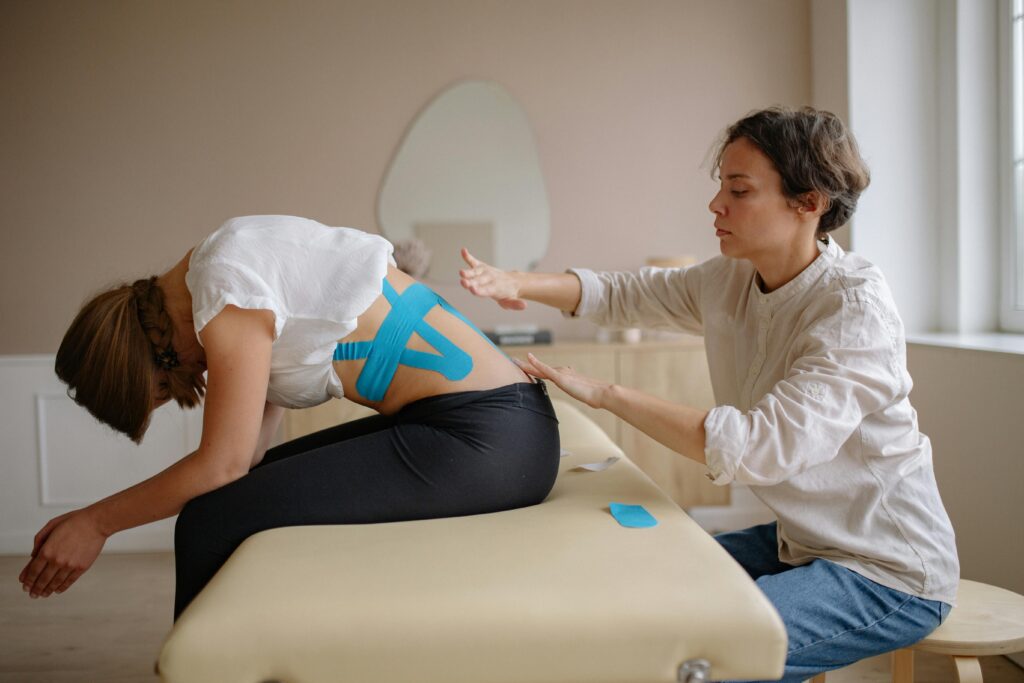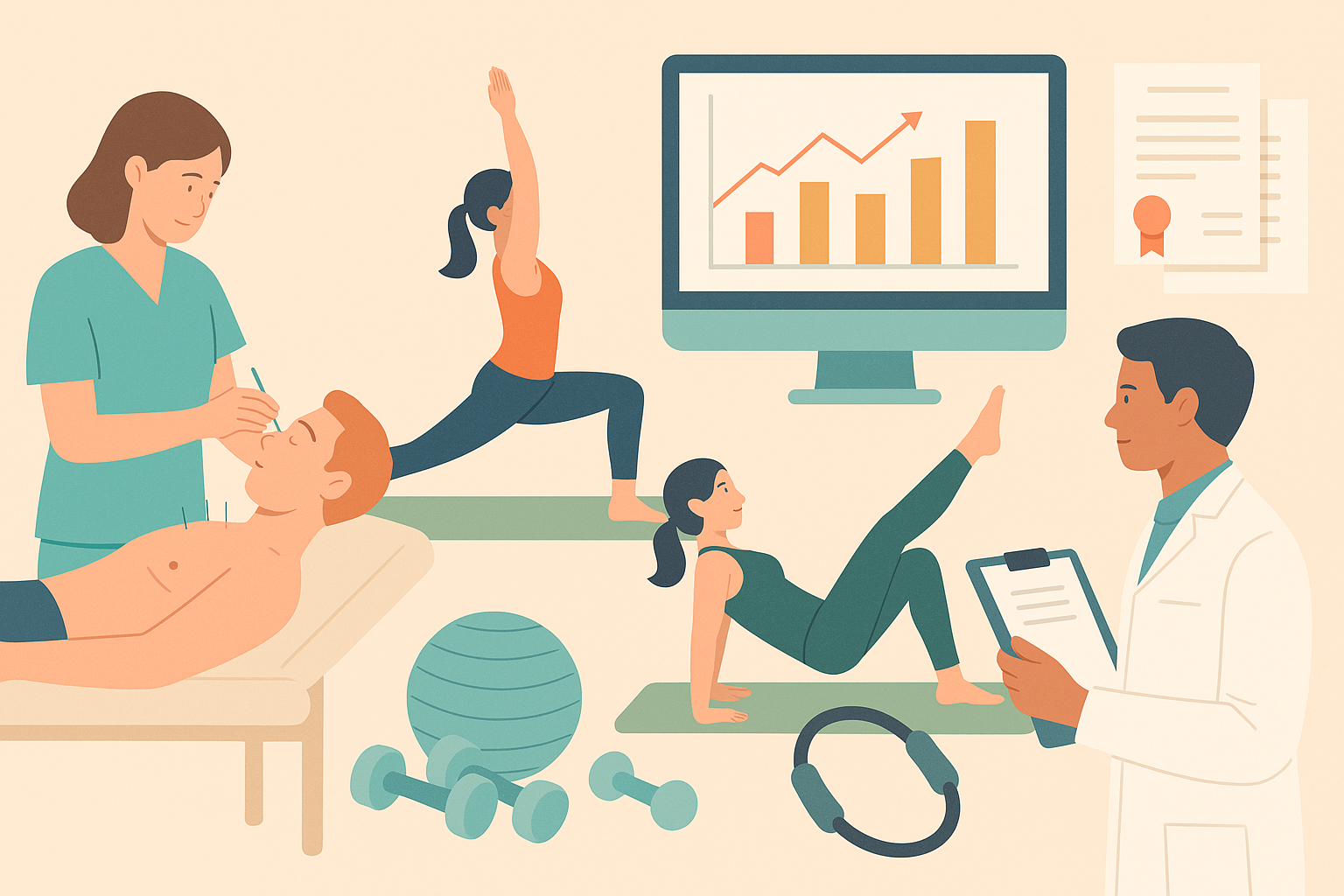Most physiotherapists think a degree is enough.
Truth? In 2025, employers are scanning for specialized, globally relevant, and tech-forward skills—and the right courses can move your resume from “meh” to “must-interview.”
Here’s the upgraded list—with some surprising truths, career hacks, and resume secrets at the end of this article that 90% of physios miss.

1. Dry Needling Certification
Insider Insight:
In Canada, certain provinces (like Alberta & Ontario) require a separate dry needling license after your main registration—and few applicants know this. Completing an internationally recognized course like the CPD Health Course or Myopain Seminars can fast-track your approval.
Pro Tip:
Mentioning “Trigger Point Dry Needling (TPDN)” on your resume specifically gets you past automated screening in hospital systems using AI-powered HR software.
2. Neurorehabilitation (Bobath/NDT or PNF)
Hidden Advantage:
In Germany and the Netherlands, clinics are heavily focused on neuro and geriatric rehab due to aging populations. Bobath-trained physios have faster visa sponsorship chances—especially in stroke rehab centers.
Pro Tip:
Use “neuroplasticity” and “functional independence” in your CV bullet points—they’re magnets for HR filters in European countries.
3. Orthopaedic Manual Therapy (OMT Level 1 & 2)
Smart Move:
Few physios know that OMT Level 2 from recognized IFOMPT programs helps bypass clinical skill exams in Australia and New Zealand if you’re applying for practice equivalency.
Pro Tip:
Add metrics! For example: “Implemented OMT protocols reducing recovery time by 20% in chronic low back pain patients.”
4. Telehealth & Digital Physiotherapy
Unlock This:
A hidden hiring trick in the US, UK, and Canada: hospitals love candidates who mention specific EMRs (Electronic Medical Records) like EPIC, Cerner, or Telerehab platforms (e.g., Physitrack, BlueJay).
Pro Tip:
Get a basic EPIC training certificate from online courses—it’s not just for doctors. It’ll give you a massive edge when applying for digital care jobs.
5. Kinesio/Functional Taping
Little-Known Benefit:
Sports clinics (especially in the Middle East and South East Asia) prefer hiring physios who can bill premium taping sessions as part of a rehab package.
Pro Tip:
Adding video links or QR codes to your resume/portfolio showing your taping techniques can impress recruiters even before an interview.
6. Pilates or Yoga Rehab (for Physios only)
International Secret:
Wellness tourism is booming in Bali, Thailand, Costa Rica, and the UAE—they’re hiring physios with dual Pilates + rehab skills for luxury resorts and clinics.
Pro Tip:
Mention “injury prevention through movement-based rehab” on your CV—wellness clinics love that phrase.
7. Clinical Research / Evidence-Based Practice
Career Hack:
Want to get into teaching, university jobs, or even product development (like working with rehab tech startups)? This course opens that door.
Pro Tip:
Take a free WHO evidence-based practice course, and showcase that in your cover letter. It screams “global thinker.”
8. Cultural Competency & Global Health
Unknown Edge:
Did you know the NHS (UK) now includes “cultural adaptability” as a core competency? A certificate in this area proves you’re ready for diverse patient loads.
Pro Tip:
Use patient scenarios that reflect your exposure to multilingual or cross-cultural treatment environments—even if they were local!
9. Women’s Health & Pelvic Floor Rehab
There are fewer than 1,500 certified pelvic health physios in all of India. In the UK, Australia, and Canada, pelvic health jobs often pay 25-30% more than general physio.
Pro Tip:
If you’re targeting international jobs, get certified by programs recognized by PHS (Pelvic Health Solutions), Australian Physiotherapy Association, or Herman & Wallace (USA).
10. APTA / APA / CPD Courses (Credible Continuing Education)
Many clinics abroad automatically shortlist candidates who mention “Continuing Education Credits from APTA/APA” even if you’re not licensed yet.
Pro Tip:
Mention course titles like: “Chronic Pain and Central Sensitization,” “Vestibular Therapy,” or “Adolescent Sports Rehab” under a dedicated ‘International CPD Courses’ section on your resume.
11. Vestibular Rehabilitation Therapy (VRT)
Secret Advantage:
Clinics in Canada, UK, and New Zealand are seeing a rise in fall-prevention, concussion, and balance disorder patients. But most physios are undertrained in VRT, making this skill super rare and in demand.
Pro Tip:
Add this line to your resume:
“Trained in vestibular assessments and habituation exercises for vertigo and post-concussion syndrome—certified via [Insert Provider].”
Where to Learn:
– Intro to Vestibular Rehab by EvidenceCE
– Emory University’s Vestibular Course (US-based)
12. Rehab Tech & AI in Physiotherapy
Future-Proofing Move:
Rehab startups globally are integrating wearables, AI tools, and movement analytics software. Learning how to work with tech like Vald, Kaia Health, or Kinotek can give you a unique edge.
Pro Tip:
List tools under a “Rehab Technology Skills” section:
“Proficient with wearable feedback systems (e.g., Kinotek, Vald), AI-based postural analysis, and remote patient monitoring platforms.”
Course Suggestion:
– Digital Health in Physiotherapy (via Coursera or FutureLearn)
13. Business & Private Practice for Physios
Hidden Career Growth Path:
Thinking long-term? A business course for physios helps you launch your own clinic abroad, or step into clinic management or consultancy roles.
Pro Tip:
After this course, include:
“Trained in private practice operations, ethical billing, and physiotherapy business strategy—ideal for leadership roles.”
Best Picks:
– Practiceology (Global)
– MedBridge Business Growth Series
14. Postural Restoration / Biomechanics Specialist Training
Elite-Level Certification:
Biomechanics-based certifications are rarely pursued but highly valued in sports clinics and elite rehab centers in countries like Qatar, UK, and Singapore.
Pro Tip:
Mention how you “integrate kinetic chain analysis with manual therapy and neuromuscular control to improve complex movement dysfunctions.”
Standout Providers:
– Postural Restoration Institute (PRI)
– Gray Institute (for Applied Functional Science)
15. Geriatric Physiotherapy with Cognitive Integration
Aging Goldmine:
By 2030, over 1 in 5 people in Western countries will be over 65. Most physios treat geriatrics physically—but courses that combine cognition + mobility (e.g. dual-task rehab) are next-level.
Pro Tip:
“Specialized in dual-task fall prevention and cognitive-motor rehab—ideal for dementia-prone or elderly patient populations.”
Where to Learn:
– CogniFit or Dual-Task Training via Dementia Care Academy
– Canadian Physiotherapy Association: Geriatric Division Courses
Bonus Value: The “Trifecta Strategy” to Stand Out Globally
Want to be unforgettable in 2025 job applications?
Combine:
- A technical course (Dry needling, OMT)
- A human-side course (Cultural competence, Women’s health)
- A digital course (Telehealth, EMR training)
Why it works: It shows you’re balanced, modern, and adaptable—and that’s exactly what employers want post-pandemic.
Ultra-Niche Bonus Courses That Will Blow Recruiters’ Minds
These are ultra-rare and give your resume unicorn status:
Aquatic Therapy Certification
In demand in: Rehab spas, luxury wellness centers, Europe & UAE
– Pro Tip: “Trained in hydrostatic resistance and buoyancy-based therapy for neuro and ortho rehab.”
Pediatric Neurodevelopment Therapy (NDT)
In demand in: UK, Ireland, Canada
– Great for school-based or early intervention roles.
Mindfulness-Based Pain Relief for Chronic Patients
In demand in: Pain management clinics in Australia, USA
– Many physios miss the psychological aspect of pain—this gives you a holistic edge.
Pro Resume Strategy: “Education + Application”
Don’t just list courses—show how you used them in real clinical situations. Employers care more about outcomes than certificates.
Example:
Before:
Dry Needling Certification – CPD Health (2024)
After:
Applied dry needling for chronic trapezius pain in desk workers—reduced pain scores by 40% in 3 sessions (Certified: CPD Health, 2024)
Bundle These Courses to Target Specific Jobs
| Goal | Courses to Bundle |
|---|---|
| Work in Neuro Clinic | Bobath + Vestibular + Geriatric + Cognitive Rehab |
| Ortho/Sports Jobs | Dry Needling + OMT + Taping + Biomechanics |
| Work Abroad | Cultural Competency + Telehealth + EMR/Tech |
| Private Clinic or Startup | Rehab Tech + Business + Digital Marketing |
| Women’s Health Specialist | Pelvic Floor + Yoga Rehab + Pain Science |
Final Note: Courses Open Doors, But Strategy Gets You Through
Courses are powerful—but only when you:
- Use the right language on your resume
- Apply what you learn in patient-centered results
- Show you’re future-ready with tech, empathy, and adaptability
Read About : High-Paying Physio Jobs Abroad You Didn’t Know Existed-Start Your Journey Now!
Visit Our Doctors At : https://g.co/kgs/rTqAjgt





